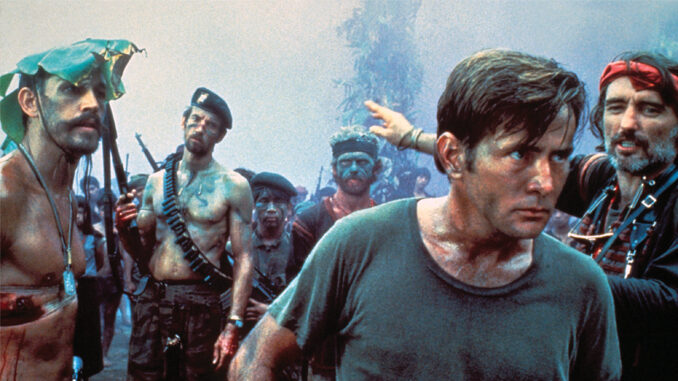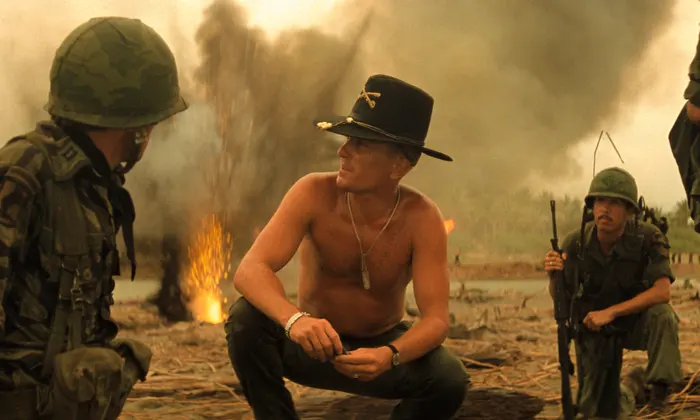A Life in Film is a project where I’m writing about a movie from every year I’ve been alive.
1979: A Place Where Americans Go and Stuff Happens to Them
APOCALYPSE NOW (dir. Francis Ford Coppola)
First off, and this is all I’m going to say on the matter: this movie represents the one situation where the music of the Doors is unambiguously good and awesome.

OK. With that out of the way: 1979 offered up a bumper crop of interesting, great movies! But there was always only one I was going to talk about. Apocalypse Now isn’t just a great movie, it might be the greatest American movie. It is not, however, the great Vietnam movie*; just sit with that for now, we’ll get there.
*That, obviously, is Return of the Jedi
I’m always conscious that I fully came online as a movie-watching adult with critical faculties some time in the 90s (I can peg it between the time I saw Fargo on initial release and didn’t get it at all** and when I saw it the second time, got it, and loved it). Before then, I still watched a lot of movies, of course, but for the most part they just kind of got piped into my brain un- or semi-digested. Apocalypse Now was definitely one of those. My parents had a copy as part of their enormous library of movies taped onto VHS***, and I watched it damn near constantly starting in 6th or 7th grade. I didn’t understand it at all—this is one of those movies where I was a voting adult before it really occurred to me to think about this as a movie with a plot and not just a series of cool scenes—but Young Me just *bathed* in the spectacle of this thing.
**I guess I’ll save the full story for a while, since it’s extremely likely I’ll be talking more about Fargo later, but I’ll tease with this: since I happened to be dating someone from Brainerd, MN, when Fargo came out, I saw the movie in Brainerd with a bunch of Brainerd locals who somehow totally swallowed the “This is a true story” dodge.
***A throughline of my extremely weird childhood that keeps becoming more and more apparent as I look back is just how much importance my parents placed on entertainment. We were always broke as hell, and yet we always had better cable than most of my friends, were pretty early adopters on VHS, and then combined those things to create a library of pirated movies much larger than the collection of books in the house. By the time I moved out, my father had moved on to getting black market satellite descrambler software that was running on an old IBM 486 sitting on top of the TV. Say what you will, I came out of it with a head full of movies.
Because Jesus Christ is this movie big on spectacle. Some directors just know how to whack you on the head with images, and Coppola’s one of the best in the game at it when he’s on. The opening! The helicopter attack on the village (and Duvall’s peacocking around during and after it)! The horrific encounter with the sampan! Chef meeting a tiger! Every second of Willard at Kurtz’s compound! This movie’s just a nonstop parade of indelible scenes which, however horrible, are powerful and impossible not to stare at, especially (again) if you’re a kid. If you’re coming to this from a place of having watched the old GI Joe cartoon, you just have no defenses against the power of cinema. The spectacle here will (and did) fry your brain.
And maybe this wasn’t so great for me. I’ve spent the rest of my life pretty interested in/obsessed with military history and equipment, and some of that has to come from direct infusions of Apocalypse Now to my developing brain. Truffaut said that it’s not possible to make a truly anti-war movie because it will always wind up looking exciting onscreen; I think my young experience with Apocalypse Now bears this out. Or maybe it doesn’t! Time and a lot of study have led me into being a person who’s fascinated with this stuff but also repelled by the reality of it. Maybe it *is* possible to make an anti-war film, as long as you dump a large stack of books on the person after they watch it a bunch of times.

I guess I was misapplying Truffaut, though, because Coppola has said that he wasn’t trying to make an anti-war movie, in language that I guess I find both nuanced and not entirely convincing. Which: fair enough, and maybe admirably clear-eyed. When talking about his intent with making Apocalypse Now, Coppola generally acts like he went insane for a few years and came out the other end with a movie and a headache, which, again, maybe admirably clear-eyed (or maybe a cop-out).
Truffaut’s wider point that war on film always looks glamorous certainly stands. Maybe it matters that Coppola thought he was making a movie that’s representative of war, and the fact that so much of it is so (compellingly) ghastly makes me think part of him felt conflicted about it all (counterpoint: John Milius was involved with the script, and it seems pretty clear that Milius thinks war fuckin rules; Milius originally wanted to end the movie with Willard and Kurtz working together to repel an airstrike on Kurtz’s compound, and I can’t even begin to think of how that was supposed to work). Coppola really worked to capture his perception of the Vietnam War; he famously said that the movie itself was Vietnam.
And that’s ridiculous, to a level that must be fairly offensive to anyone who was there (alternately, hilarious). But there’s a powerful, probably accidental, thing there. If you really pay attention to the bigger picture, the movie isn’t really about the war at all. It’s set there, but the war is just something going on in the background as Willard goes on his quest (put another way: the movie’s visuals are so dazzling, its performances so mesmerizing, that it manages to make us all forget that really this is just a clever setting for an adaptation of Heart of Darkness). Apocalypse Now examines almost nothing about the cause of the war or its progress; it has very little time for looking at the actual lived experience of people fighting in it, and almost none at all about the people on whose behalf it was being fought. You never see the North Vietnamese Army or Viet Cong! The only Vietnamese civilians are the people in the sampan who get machine-gunned!
In this movie, the Vietnam War isn’t a real war, and Vietnam isn’t a place with its own people and history and struggles; it’s just a place Americans go to where bad things happen to them. Which is a *really* accurate representation of the way Americans see the world! It’s absolutely the guiding spirit of a hell of a lot of American foreign policy and American attitudes towards the rest of the world. I don’t think it’s a point Coppola set out to make, but it’s a hell of an astute point anyway, and nothing but respect to him for making it, even if by accident.
Apocalypse Now isn’t a movie that I go back to very often, because, well, big parts of it are just way too uncomfortable for me now. Even setting aside all of the war stuff, I have a hard time watching an actual water buffalo actually get hacked to death. But it’s a monumental movie.
Great Keith. I’ve been looking forward to your take on Apocalypse.
A heart of darkness, indeed. Willard? America? Human Nature?
Like literature, great movies are timeless, complex, and always make you examine your own time and place….which of course, we are always influenced by. This idea may help explain how Coppola may have “accidentally” made his point regarding American Foreign Policy.
The movie was made when the zeitgeist was still one of American hegemony and moralism. So even-though he was meta enough to see how irresponsible US involvement in Vietnam was, Coppala’s sub-conscience still saw the world through the “a place we go where bad things happen to us” point of view. And this point-of-view seeps into the movie. Interesting, I have been watching this movie for forty years now, and of course, the juxtaposition between the zeitgeists (then and the time of watching) has always varied.
On another point, the struggle between Milnius’ vision of the movie with Coppala’s (throughout), reminds me of the struggle between the two points of view in our polar-politics period. (Did you know Milnius made Red Dawn?) In a crazy way, these competing visions of the movie represent the competing visions of America’s view of the world.
Cheers!
“My extremely weird childhood” sounds like a good title of a book!
Thanks, man, all around!
And yeah, I actually ended up watching Red Dawn recently, and then doing some reading about the backstory of it, and: wow, what a weird time capsule. If nothing else, it’s a pretty satisfying movie to sit and pick apart the logistics of.